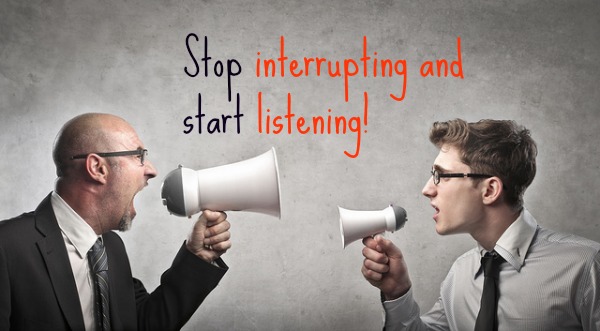How to Win Anyone over with Rockstar Communication Skills: 4 Tips to Stop Interrupting
Sometimes people have problems with interrupting others. With constant interruptions, effective communication is almost impossible. When we interrupt someone, it usually means we are not listening to them properly in the first place.
By offering our own thoughts and opinions before the other person has properly expressed theirs, we run the risk of mentally shutting down from the conversation and ignoring valuable new information and insights.
If you recognise this tendency in yourself, try the following communication skills to stop interrupting
1. Communication skill: Write down what you wanted to say…
…instead of blurting it out. Often, we interrupt because we don’t want to forget what comes to our minds while someone else is speaking.
As if to remind ourselves and “put it out there”, we blurt out what we’re thinking instead of writing it down. If you don’t have paper to hand, make a mental note and come back to your thoughts once it is the designated time for asking questions.
2. Communication skill: Focus on keeping your mouth shut.
And this means, physically focus on keeping your lips together. You can do this as easy as you can focus on any aspect of your body.
Try it now: pay close attention to the pressure of your seat on your bottom. See how easy it is? Often, we simply open our mouth while someone is talking because we’ve lost control over it, and control often stems from focus.
Of course, if we lose focus on keeping our mouth shut, we may still lapse…
3. Communication skill: If you find yourself interrupting, correct yourself…
…and invite who you’re listening to continue speaking. Saying something like: “Oh, sorry, please go on…” will serve to apologise for the interruption and will even encourage more openness from the other person.
As you do, don’t forget tip 1 and jot down what you wanted to say. For habitual interrupters, this can be hard work. Like any new habit, it’s worth it though!
4. Communication skill: Practice not interrupting.
Yes, that means listening to someone and waiting three seconds (try saying “one Mississippi, two Mississippi, three Mississippi” to yourself and that is about the amount of time you need to pause) before talking.
One thing I’ve found useful is to ask “was there anything else you wanted to say about that?” before proceeding with my point of view.
Doing this often results in a “no” from the other person. This means that I can be sure that I’ve heard everything they want to say for the moment and that they’ll be ready to listen to me in the same way I’ve been listening to them.







[…] a one-time general course, it’s a good idea to split up your team up by experience and by the skills they need to learn. As training goes on, the more likely your team should be split into streams that enable them to […]
[…] than logic. This is why we take a highly emotion-centred approach when carrying out interpersonal communication skills training for either sales or customer service. […]
[…] It is how we form relationships, how we get along with others – how we work and play together. Communication skills are a subset of these interpersonal skills and describe how we share our thoughts, needs, desires, […]
[…] It strengthens communication skills. More knowledge enables the sales person to explain things in different ways and with fewer words, […]
Our belief is the fact that as people start making use of the newest experience, they will certainly come to love it actually more than they loved Hotmail.
This information is impressive..I am inspired with your post writing style & how continuously you describe this topic. After reading your post, thanks for taking the time to discuss this, I feel happy about it and I love learning more about this topic..